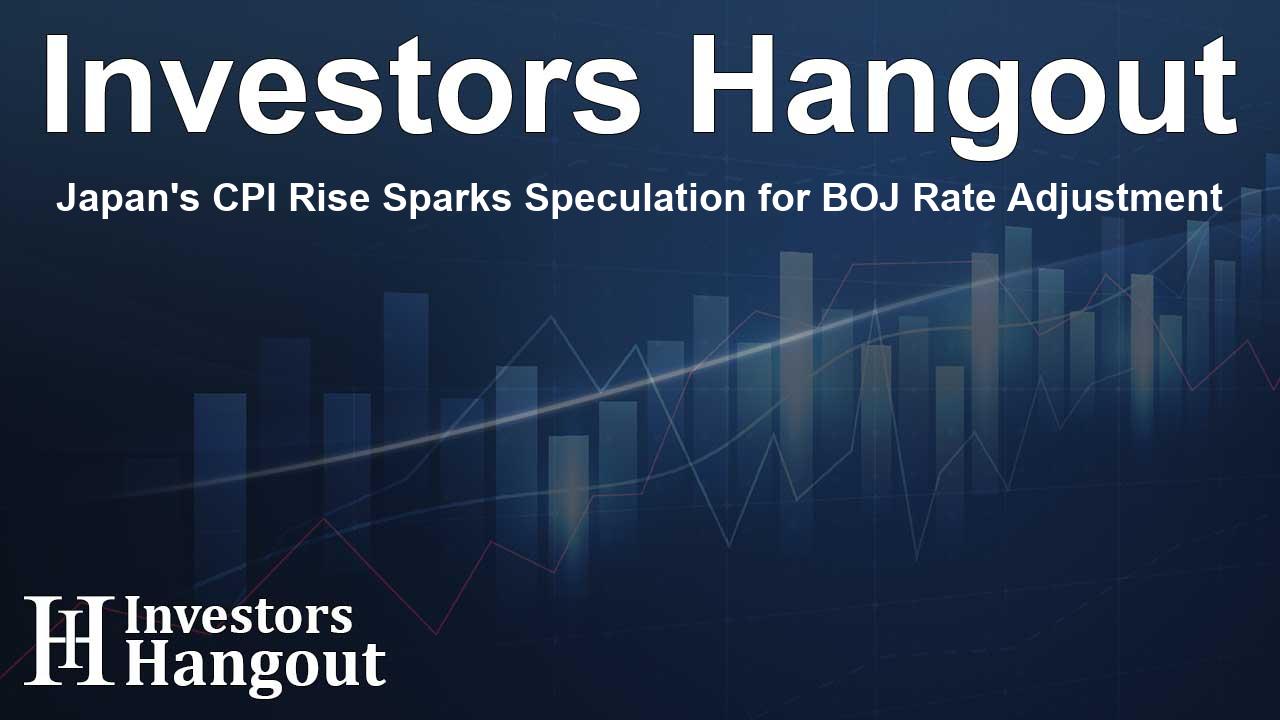Japan's CPI Rise Sparks Speculation for BOJ Rate Adjustment

Japan's CPI Growth Signals Potential Interest Rate Hike
Japanese consumer price index (CPI) inflation has slightly exceeded expectations, hinting at a persistent rise in inflation that may prompt the Bank of Japan (BOJ) to consider increasing interest rates in the near future. The increase in CPI was recorded at 2.7% year-on-year in November, surpassing expectations of 2.6% and showing a growth from 2.3% observed in October.
Core CPI Measurement Reveals Inflation Trends
A core CPI figure that excludes both fresh food and energy costs increased to 2.4% year-on-year in November, up from 2.3% the previous month. This reading remains significant as it is above the BOJ's targeted annual rate of 2%. The continued rise in this measure suggests that inflationary pressures are enduring, warranting close attention from the central bank over the upcoming months.
Impact of Rising Consumer Demand
The headline CPI surged to a four-month high of 2.9% in November, compared to 2.3% in the prior month. This increase can be attributed to stronger private consumption, alongside improvements in wage scenarios, which fostered higher spending on discretionary goods.
Future BOJ Meetings and Rate Predictions
Recent data arrives in the wake of the BOJ's decision to keep interest rates unchanged during its final meeting of the year. Although no immediate changes were indicated, the BOJ forecast continual inflation growth is anticipated, suggesting a potential for rate hikes should inflation levels escalate further in the upcoming months.
Upcoming Economic Indicators
Market observers are eagerly awaiting the Tokyo CPI data for December, expected to provide additional insights into inflation trends. These indicators will be pivotal in shaping expectations around BOJ policy adjustments.
Labor Negotiations as a Key Focus
Additionally, BOJ Governor Kazuo Ueda highlighted the significance of upcoming wage negotiations between major labor unions and companies, scheduled to take place in the spring. The outcome of these discussions could greatly influence inflationary trends and ultimately the BOJ's monetary policy decisions.
Frequently Asked Questions
What does the recent CPI data suggest for the BOJ?
The recent CPI data indicates a continued rise in inflation, which may influence the BOJ to consider rate hikes if the trend continues.
How does the core CPI affect the economy?
The core CPI, excluding volatile elements like food and energy, provides a clearer picture of underlying inflation trends, impacting monetary policy decisions.
Why are wage negotiations important for inflation?
Wage negotiations can affect consumer spending power and hence, overall inflation. Higher wages often lead to increased spending, contributing to inflationary pressures.
What economic data will be released next?
Upcoming Tokyo CPI data for December is expected, which will help analysts gauge continued inflationary trends in Japan.
What are the implications of a BOJ rate hike?
A BOJ rate hike could impact borrowing costs, consumer spending, and overall economic growth. Such a move could also influence currency valuation and international trade dynamics.
About Investors Hangout
Investors Hangout is a leading online stock forum for financial discussion and learning, offering a wide range of free tools and resources. It draws in traders of all levels, who exchange market knowledge, investigate trading tactics, and keep an eye on industry developments in real time. Featuring financial articles, stock message boards, quotes, charts, company profiles, and live news updates. Through cooperative learning and a wealth of informational resources, it helps users from novices creating their first portfolios to experts honing their techniques. Join Investors Hangout today: https://investorshangout.com/
Disclaimer: The content of this article is solely for general informational purposes only; it does not represent legal, financial, or investment advice. Investors Hangout does not offer financial advice; the author is not a licensed financial advisor. Consult a qualified advisor before making any financial or investment decisions based on this article. The author's interpretation of publicly available data shapes the opinions presented here; as a result, they should not be taken as advice to purchase, sell, or hold any securities mentioned or any other investments. The author does not guarantee the accuracy, completeness, or timeliness of any material, providing it "as is." Information and market conditions may change; past performance is not indicative of future outcomes. If any of the material offered here is inaccurate, please contact us for corrections.